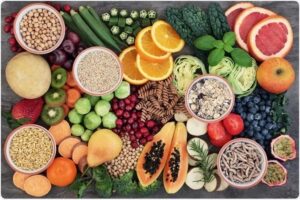In today’s fast-paced world, with more people reaching for quick and processed meals, the significance of consuming a balanced diet can often get lost in the mix. However, there’s one essential component that we should never overlook: fiber. Fiber is a type of carbohydrate found in plant-based foods like fruits, vegetables, grains, legumes, and nuts, which plays a crucial role in maintaining overall health. In this article, we will explore the importance of fiber in your diet and how it can have a profound impact on your health.
What is Fiber?
Before diving into the benefits, it’s essential to understand what fiber actually is. Unlike other carbohydrates, fiber is not digested by the body. Instead, it passes through the stomach and intestines largely intact. This makes fiber an indigestible carbohydrate that serves multiple purposes in our digestive system. Fiber is classified into two main types: soluble and insoluble fiber.
- Soluble Fiber: This type of fiber dissolves in water and forms a gel-like substance. It helps to lower cholesterol levels and control blood sugar levels. Foods rich in soluble fiber include oats, beans, lentils, apples, and citrus fruits.
- Insoluble Fiber: This type of fiber does not dissolve in water. It adds bulk to stool and helps food and waste pass more quickly through the digestive tract. Whole wheat, brown rice, and vegetables like carrots and cauliflower are good sources of insoluble fiber.
Both types of fiber are essential for a well-functioning digestive system and provide distinct benefits to the body.
Why is Fiber Important for Your Health?
Now that we know what fiber is, let’s dive into why it is so important for our health.
1. Promotes Digestive Health
One of the most significant roles of fiber is promoting digestive health. Insoluble fiber, in particular, helps keep the digestive system moving by adding bulk to stool. This can prevent constipation, a common digestive issue that affects millions of people worldwide. Regular bowel movements are vital for the removal of waste and toxins from the body. Consuming enough fiber helps maintain healthy bowel function, reducing the risk of conditions like hemorrhoids and diverticulosis.
In addition to preventing constipation, fiber-rich foods can also reduce the risk of certain digestive disorders, including irritable bowel syndrome (IBS) and colorectal cancer. Studies suggest that a high-fiber diet may protect the colon by promoting regular bowel movements and maintaining a healthy gut microbiome.
2. Aids in Weight Management
Fiber is a great ally in managing and maintaining a healthy weight. One of the key reasons fiber helps with weight management is that it increases feelings of fullness and satiety. Since fiber takes longer to digest, it helps you feel fuller for longer, which can reduce your overall calorie intake. This is especially true for foods high in soluble fiber, such as oats and legumes, which help control appetite and prevent overeating.
Additionally, foods high in fiber tend to be lower in calories but rich in nutrients, making them a great option for those looking to lose or maintain weight. Incorporating more fiber into your meals can help you manage hunger and reduce the temptation to snack on unhealthy, calorie-dense foods.
3. Supports Heart Health
Fiber plays a significant role in promoting heart health, particularly by reducing cholesterol levels. Soluble fiber, in particular, binds to cholesterol in the digestive system and helps remove it from the body. This can lead to a reduction in LDL (low-density lipoprotein) cholesterol, commonly known as “bad” cholesterol. Lower cholesterol levels help decrease the risk of developing heart disease, high blood pressure, and stroke.
Several studies have shown that people who consume a high-fiber diet have a lower risk of heart disease. For example, a study published in the American Journal of Clinical Nutrition found that for every 10 grams of fiber consumed per day, the risk of heart disease decreases by 14%. Foods like oats, beans, fruits, and vegetables are excellent sources of soluble fiber, which can help maintain healthy cholesterol levels.
4. Regulates Blood Sugar Levels
Fiber plays an important role in regulating blood sugar levels, particularly for individuals with type 2 diabetes or those at risk for the condition. Soluble fiber slows the absorption of sugar, preventing rapid spikes and crashes in blood glucose levels. This can help improve insulin sensitivity and reduce the risk of developing diabetes.
Incorporating fiber-rich foods into your diet, such as beans, lentils, and whole grains, can help manage blood sugar levels and prevent insulin resistance. A high-fiber diet has been shown to lower the risk of developing type 2 diabetes and can improve blood sugar control in people already diagnosed with the condition.
5. Boosts Gut Health
The health of our gut is critical to our overall well-being, and fiber plays a vital role in maintaining a healthy gut microbiome. Fiber serves as food for the beneficial bacteria in our gut, helping them thrive. A healthy gut microbiome is essential for digestion, immune function, and even mental health. Research has shown that a fiber-rich diet can promote the growth of beneficial gut bacteria, which in turn supports the immune system and reduces inflammation in the body.
Moreover, fiber helps to regulate bowel movements, which ensures that waste and toxins are efficiently eliminated from the body. A healthy gut and digestive system are fundamental to preventing chronic diseases and promoting overall health.
6. Reduces the Risk of Certain Cancers
A diet high in fiber has been linked to a reduced risk of certain cancers, particularly colorectal cancer. The mechanisms behind this protective effect are not yet fully understood, but it is believed that fiber helps by promoting regular bowel movements and reducing the time that harmful substances stay in the colon. Additionally, fiber-rich foods like fruits, vegetables, and whole grains contain a variety of antioxidants and phytochemicals that have cancer-fighting properties.
Several studies have suggested that a high-fiber diet can reduce the risk of colorectal cancer by up to 40%. By maintaining a healthy digestive system and consuming fiber-rich foods, you can lower your chances of developing this serious condition.
How Much Fiber Do You Need?
The recommended daily intake of fiber varies depending on age, sex, and other factors. According to the Institute of Medicine:
- Women under 50: 25 grams of fiber per day
- Women over 50: 21 grams of fiber per day
- Men under 50: 38 grams of fiber per day
- Men over 50: 30 grams of fiber per day
Unfortunately, many people fall short of these recommendations. The average fiber intake in the United States is only about 15 grams per day, which is significantly lower than the recommended amount. To meet your daily fiber needs, it’s important to incorporate a variety of fiber-rich foods into your meals.
How to Add More Fiber to Your Diet
Adding more fiber to your diet is easier than you might think. Here are some simple ways to boost your fiber intake:
- Start Your Day with Whole Grains: Choose whole-grain breakfast cereals, oatmeal, or whole-wheat toast over refined grains.
- Snack on Fruits and Vegetables: Snack on raw veggies, fruits, or homemade smoothies. Apples, carrots, and berries are excellent choices.
- Incorporate Legumes: Add beans, lentils, and peas to salads, soups, and stews.
- Choose Whole Grains: Switch to whole grains like brown rice, quinoa, barley, and whole wheat bread instead of their refined counterparts.
- Use Fiber-Rich Additions: Consider adding chia seeds, flaxseeds, or psyllium husk to smoothies, yogurt, or baked goods for an extra fiber boost.
Conclusion
Fiber is an essential component of a healthy diet, and its importance cannot be overstated. From improving digestive health and regulating blood sugar levels to supporting heart health and preventing certain cancers, the benefits of fiber are vast and impactful. By incorporating more fiber-rich foods into your meals, you can improve your overall health, manage your weight, and reduce your risk of chronic diseases. So, the next time you’re planning a meal, remember to include plenty of fruits, vegetables, whole grains, and legumes—your body will thank you for it!







